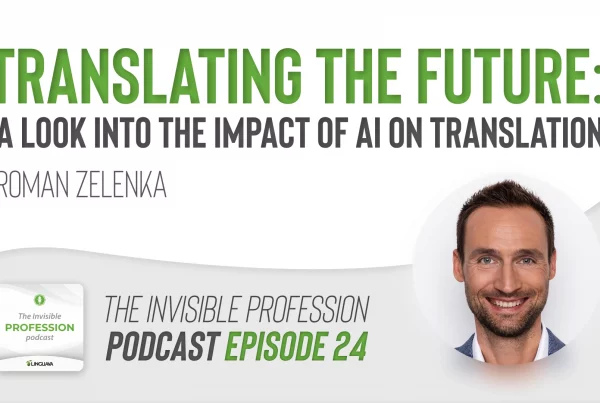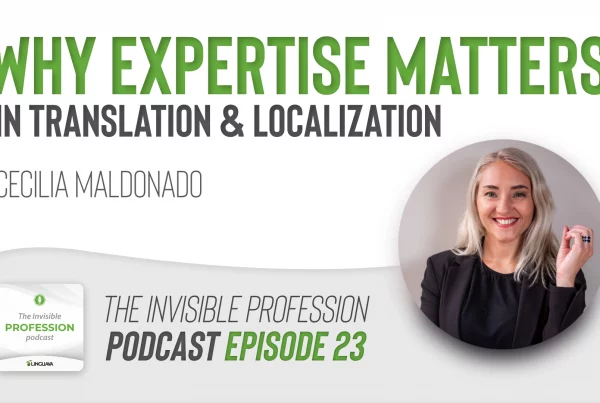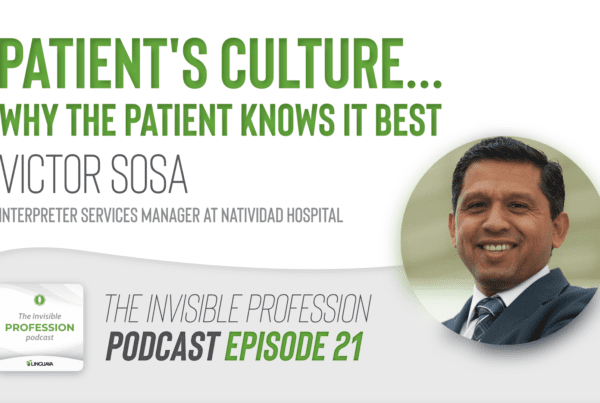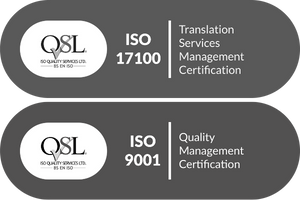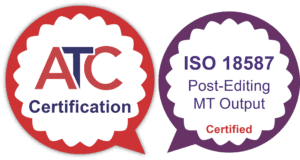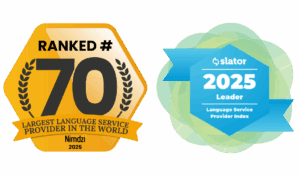In this episode of The Invisible Profession podcast, we are discussing Oregon’s House Bill 2359 with Bill Rivers, an expert who has worked on language policy for over 2 decades. HB 2359 states that medical providers must first request healthcare interpreters from the OHA healthcare registry for on-site appointments before requesting someone not registered. The OHA healthcare registry is a list of interpreters who have been tested and have achieved qualification/ certification.
During this podcast, we’re going to look at what the bill means for medical providers, and for interpreters. We ask, what is the purpose of this legislation and what are the unintended consequences? The purpose of this bill is to improve language access to patients in Oregon, but can this be achieved within the constraints of the bill?
“The purpose of the legislation is to improve language access for healthcare patients in Oregon, which is a laudable purpose. We all want to see that. There were different factors that led to the passage of this bill. There was a desire to improve the operations of the Oregon Healthcare Interpreter registry. There was some pressure from interpreters unions, to push a higher level of qualifications into the system. And so we saw this bill come together last Spring in the Oregon Legislature. And it passed and it created some requirements that we’re trying to sort out and deal with… There may be some unintended consequences, that of the way the legislation is written, that might actually interfere with the provision of language access to Oregonian patients. ” – Bill Rivers
Dr. Bill Rivers is Principal at WP Rivers Associates. A former Russian-English translator and interpreter, Russian teacher, academic researcher and administrator, and for-profit and nonprofit executive, he has more than 30 years’ experience in language advocacy and capacity at the national level, with significant experience in culture and language for economic development and national security in the Intelligence Community, private and academic sectors, and publications in second and third language acquisition research, proficiency assessment, program evaluation, and language policy development and advocacy. His company is contracted by the ALC for advocacy support.
Listen to Linguava’s podcast on all your favorite platforms here.
Connect with us on your favorite social site:
LinkedIn | Facebook | Instagram
At Linguava, we are dedicated to reducing communication barriers and providing equity to all members of our community through language access services.
If you are interested in learning more about incorporating language access into your organization or would like to book a training session, contact us today.
Transcript – The Invisible Profession Podcast Ep. 022 – HB 2359 with Bill Rivers
David: Welcome everyone to this episode. I am your host, David Brackett, and I am really excited to be here today with our special guest, Dr. Bill Rivers. Dr. Bill Rivers is someone who’s been a language service industry expert and advocate for more than 30 years. He’s worked in many different capacities from working in conferences, working in associations, working with language service providers directly, working with language companies, as well as being a Russian interpreter and translator himself.
He knows the industry in and out. He’s seen almost everything at this point and worked all around the globe tirelessly to be a true advocate for meaningful language access at every step of the patient journey. And it’s one of the reasons why I love partnering with him and having him in our corner, in our industry to really be there to make sure that every individual – Limited English Proficient individual, and Deaf and Hard of Hearing is getting the language access, and health equity that they deserve and have the right to. Bill, welcome to the show.
Bill: David, thank you very much for inviting me. I’m thrilled to be here. My perspective on this comes from a very long time working on language access, which I started really in 2000 after the promulgation of executive order 13166, which was really the Keystone Federal, it’s not regulation, it’s a presidential executive order, but the federal rule that said, if you are a recipient of federal funds and you serve limited English proficient clients, and in this case, of course, patients, then you must provide meaningful language access. And so I’ve been working on this in a lot of different ways for more than 20 years.
And the intersection of language access and advocacy at the state level and having, a very important and in some ways, very challenging bill in Oregon has been, it’s been a really interesting and exciting thing to work on.
David: And today we’re gonna talk about a very important topic. House Bill 2359. Many of you have heard about this, maybe whether you’re in Oregon or you have interpreters that might work in Oregon, provide services in the State of Oregon and are impacted by this bill. And so today we’re gonna really unpack what the bill means for you as a medical provider.
What does it mean for you as an interpreter? What does it mean for you as an organization? And where do we go from here? Where do we do things well with this bill and where do we need to make some improvements to make sure that health equity and language access are being provided at every step. So Bill let’s start back at the very beginning.
What exactly is HB 2359, and how did it get started?
Bill: The purpose of the legislation is to improve language access for healthcare patients in Oregon, which is a laudable purposes. We all wanna see that. There were different factors that led to the passage of this bill. There was a desire to improve the operations of the Oregon Healthcare Interpreter registry.
There was some pressure from interpreters unions, to push a higher level of qualifications into the system. And so we saw this bill come together last Spring in the Oregon legislature. And it passed and it created some requirements that we’re trying to sort out and deal with. And I know for a lot of the audience, those are some pretty challenging requirements. I know we’re gonna talk about them.
But again the purpose of the legislation on its face is to improve language access for patients in Oregon. Whether there may be some unintended consequences, that of the way the legislation is written that might actually interfere with the provision of language access to Oregonian patients. And I know we’re gonna get into that.
David: So my next question for you Bill is, as far as data goes, do you know what type of data they looked at and evaluated in order to create the HB 2359?
Bill: Unfortunately we don’t think any data were utilized as nobody ever asked the language industry for data, or as far as we know, and we’ve talked to the folks on the major healthcare providers and they weren’t asked either. How many people are getting language access, in which languages, in which circumstances, regular appointments, emergencies, et cetera. In which locations, all of which are really important considerations in terms of public policy around language access. The legislature did not reach out and ask for data as far as we know, and it’s reflected, I think, in the bill and in the regulation that they developed.
David: As far as language representation, this is one of the things that I looked at when I was looking through the data. And there is a extremely limited pool of interpreters that are available today in the Oregon Healthcare Registry for interpreters that are Qualified or Certified. The numbers of course fluctuate depending on if they renew their Qualification or Certification. And of course, new interpreters do join. So it’s somewhere between the numbers of 25 to 36 active interpreter languages that are represented in the registry. Many of which only have one interpreter for the entire state of Oregon.
Last time I checked I believe there was three Korean Certified interpreters for the entire State of Oregon. So you can see that there’s a severe limitation right there with the amount of interpreters that could even take jobs in Oregon for a particular part of town, because one interpreter can only do one job at a time, as we know, and for onsite interpretation, it can only be in one place at one time. And so geographically it becomes a real burden and a challenge there as as well.
Bill: There are 10 Somali interpreters in the the registry for the whole state of Oregon. And you know that I brought up the issue of where the interpreting takes place and how it takes place too. So Oregon’s a pretty big state I’m in, I live in Maryland. We’re long, skinny states, like 400 miles this way, east to west and places.
It’s only two miles north to south about 38,000 square miles. Where I live, I’m no more than two hours away from any place else in Maryland. 80% of the population lives in the central part. Oregon’s bigger than Maryland, but you still have, between Portland and Eugene, you’ve got a huge population, but that doesn’t mean that the people in Tillamook or Bend or Malheur county, if they’re LEP patients there, and there are that they aren’t entitled to language access as well.
And so that’s why the location matters. And it’s also why the, in those data, it’s also why the modality matters. We estimated the industry estimates, at least 1.2 million remote interpreting encounters for healthcare in Oregon in 2021, 1.2 million and that’s 24/7/365. Okay.
There’s no way that a thousand interpreters can provide 1.2 million encounters. So it’d be a thousand a year. That would be, at least three, a day three, if they’re working 365 days a year and for languages, you have data that, that, that showed Linguava had, I think 103 languages billed in one year.
If we have the other companies. We’re pushing 150 languages. There’s only 22 in the database. So that then brings up the next question. Where are the interpreters? They’re all over the US. And if I’m a Ukrainian interpreter in Chicago or Zapotec interpreter in Bakersfield or San Diego, what incentive do I have to go through the process to get on the Oregon Registry?
It’s not gonna make probably that much difference to me if I can’t work in Oregon, cuz I’m gonna have lots of other work. But it makes a big difference for the companies and the medical providers who need that interpreting in Oregon. If they’re not gonna be in the registry.
David: One of my concerns about the bill is the potential delay in providing immediate healthcare where someone might be searching for a qualified, certified interpreters. And given the limited amount of individuals on the registry frequently, the healthcare providers would encounter a delay trying to locate a qualified or certified interpreter only to find that there are either none in the registry or there are none that are available.
Bill: The way the law was written and then the regulation that the Oregon Health Authority developed, a language service company has to see first if there’s somebody available on the registry. And then if there’s not, then they can provide somebody who’s not on the registry.
What’s unclear, even in the regulations, like how’s that really gonna work on the ground? Somebody shows up in an emergency room and now you need May May or Zarma, these are real languages, by the way, I’m not making these up, Kanjobal, etcetera. Which we, as an industry can provide, we know how to do that, but how’s that gonna work? Okay. All right David this is, Oregon hospital and we need this interpreter and you’ve got a patient who’s right there needs the interpreter now and we’re adding these additional steps. How’s that gonna work? Or there is an interpreter available and you’re gonna start asking them to bid on an assignment. That is again, and this is again, it’s also because we were able to get a one year grace period for remote interpreting through the negotiated rulemaking process.
David: And just to clarify one thing as well as currently the bill only enforces onsite interpretation throughout the state of Oregon to exhaust all resources with qualified and certified interpreters. For remote interpretation that is over the phone interpretation and video remote interpretation.
There is not a current requirement from the state to meet those requirements as of yet. That will be still in discussion and looked at by the end of next year in or in July of next year, 2023.
Bill: A grace period that ends next summer. That’s a tough one because in fact, the vast majority of language access is provided remotely for a wide variety of reasons.
If you’re out in Bend it’s a diverse community, but there’s just not enough of any one population to have an onsite community of site people who live there. So if you’re gonna do onsite, they’ve gotta drive in from someplace else. Or there’re languages where, there’s small populations overall in the United States and the resources to provide language access are scattered all over the country.
The only way to provide that is remotely, or again, it’s an emergency situation has to be done right now. I know the language service companies that work with healthcare have service level agreements that say we’re gonna get somebody on the line in a very short period of time, 30, 60, 90 seconds, depending on the language, that’s essentially like this, how is that gonna work?
If you gotta go to the registry and check to see if someone’s there and all this stuff. That’s why I think we have the remote exemption for now. But it’s not clear is gonna happen with that exemption and it’s not clear what happens if it goes away. We’re very, I think all very concerned about the consequences, about our ability to provide language access.
David: One of the additional challenges with remote interpretation is that remote interpreters, as we all know, can be virtually anywhere in the country or in the world and limiting Oregon to only working with qualified or certified interpreters, there is just, isn’t a current pool of interpreters in the state of Oregon that are doing remote interpretation.
Bill: Our concern will be too much trouble for them. They’ll be able to make up what they’re not getting out of Oregon from 55 other states and territories and, and then there’s a challenge of certification. As much as we support certification a, an occupationally valid test for employment or purposes of work or, personnel certification, et cetera, is actually quite expensive to develop and requires a certain number of tests subjects to that to be psychometrically validated.
All right. . And so that’s really only feasible economically feasible in a very small number of languages. Theoretically feasible in an only slightly larger pool of languages. We’ll never have enough candidates in Kanjobal or Nahuatl. To develop a certification test in that language. Now there are options, there’s the core CHI from the certification commission on healthcare interpreting that couples a language proficiency assessment where we can determine your proficiency in another language with some core principles of interpreting and so on.
That’s not the same as doing a Spanish interpreter certification test where you’re actually, demonstrating your ability to certify to interpret Spanish. So that’s another area where again, you can say, we want certification for all of our interpreters really is only theoretically feasible in one language.
And even in Spanish, we do not have enough certified interpreters in Oregon to meet the current demand for onsite. Even if every Spanish interpreter were certified in the database, in the registry and certainly not to meet the demand for remote and that’s the same nationally it’s just not there just aren’t enough people getting certified to, to meet the demand, even in the major languages.
And like I say, when you get down. There’s no test in Ukrainian. There’s no test in Gujarati, which is one of the top 20 languages in the US, there’s no certification test in in Bahasa, Indonesian and Malaysia, there are 200 million people who speak it in the world, not 200 million in the US.
So we’ll really run into this question of how do we as an, as a language industry and as an interpreting profession, determine that people are qualified, demonstrate that they’re qualified. Turns out we have really good procedures for doing that. And even standards for it, both at the national level and international level.
ASTM F 2089, which is an international standard on interpreting they’re ISO international standardization organization standards for medical interpreting that are available to provide alternative pathways when there’s just not gonna be a certification test.
And that those could be brought into the fold as well. And then all of our language service companies have their own internal tests and processes and sometimes there’s pushback from the broader interpreting community. Linguava’s test can’t be any good because they’re using Bill and he’s an idiot.
Okay. But. Endpoint of fact you are taking on the language service industry is representing to its clients that yes, these people are qualified. They’re gonna do a good job. They are not going to create liability for you in the provision of language access. And we’re putting our reputations on the line, putting our companies on the line when we do that.
So it’s sometimes it’s a little, this push pull oh, you’re you’re not pure enough kind of well, okay. But it’s not a, it’s not a third party certification test. But in fact, it’s still a rigorous process and any reputable language company of any size is gonna have a rigorous process because it’s just too, there’s too much on the line if you don’t.
David: Like we were mentioning earlier by creating a specific unique requirement that only pertains to interpreters working within the state of Oregon. It ultimately ends up limiting the pool of interpreters that are out there that meet the same requirements on a national level. However, don’t meet the state requirements, therefore are unable to be an additional resource to the patients of Oregon.
I wanna talk about the importance of partnerships as well. Cause one of the things that I think about is how to get something like this right? And the way to do it is to partner with all stakeholders at the table. Everyone gets a seat at the table. And I think that’s one of the things that currently is missing from the way that I see it.
I was talking with someone from OHA who works in the the refugee resettlement department of OHA. And they were sharing with me one of the ways in which a similar situation like this, that, that actually worked out well where the state was making certain requirements.
Cultural requirements for community healthcare workers and the type of cultural care that they were providing to the community and the community healthcare workers turned back to the state and said, look there’s currently not these resources that we have in our pool of community healthcare workers.
So we can’t have a certain requirement to meet this certain level of care and standard if we don’t have the available resources. And they ended up working together to be able to create that and provide those kinds of resources, so that the ultimately the community would benefit by having culturally sensitive care.
In a similar note. I see that as being an opportunity here where we can bring providers to the table, interpreters to the table, as well as the state and the language service companies to the table. And even the patients should be there as well, because at the end of the day, that’s who we’re all here to serve.
And make sure that each stakeholder is being heard and what are gonna be the consequences or unintended consequences of each action to make sure that we’re making the best decisions. I think that’s really the next step that I would like to see is be really bringing everyone to the table.
Bill: There’s a lot of law and regulation that says you have to provide language access. It doesn’t say that you get off the hook. If the person happens to speak, a language of lesser diffusion, that’s hard to find. Or if they’re in a remote, rural area, you still have to provide language access. There’s still civil rights liabilities, right?
Under both title six and the Patient Protection and Affordable Care Act at the federal level, doesn’t matter what the language is. And it doesn’t matter where the location is. And again, we know how to do that. We know how to provide that language access. That’s what we do as an industry. And I, it just sometimes seems to me that there’s a focus too often in just we’re all take care of one language and that’ll get it done. You know you can’t you got to take care of all the languages.
And we know now we have 30 plus years of high quality research in top line medical journals. A study just came out about two months ago in the new England Journal of Medicine from Harvard and Mass General that the provision of language access leads to better patient outcomes.
So you’re saving lives and making lives better and you’re saving money in healthcare. You save more money providing language access than you spend on language access. So it’s really critical that we do this and it’s 70, roughly 70 million Americans, seven zero million speak another language at home.
There are about 10%, 10 to 15% are considered linguistically isolated, depending on which census data set you’re looking at. But in reality, it’s far more than those folks who will need language access. My in-laws are Armenian immigrants came here in the 1970s. They’ve been here for 40 plus years getting on in years.
My, my father-in-law’s gonna hit 90 in a couple of weeks. His, when he goes to the medical facility, he actually needs an interpreter. Now he didn’t used to, but now he does. When people show up at the emergency room, they may well live their daily lives, outside the house in English, perfectly fine, but they may well need an interpreter when they get there.
We have the systems that are there to provide that. The healthcare provider, they know how to identify that, provide that. And I think we don’t wanna get in the way of that improving quality. Yes, absolutely improving qualifications. Yes, absolutely. Let’s not throw the baby out with the bath water. Let’s not create additional problems for ourselves.
David: Bill, I just wanna take a moment to say thank you so much for the language advocacy work that you do, not only here in our community, but throughout the world as you, you partner with many associations and organizations that are literally touching lives across the globe. Everyone has the right to receive that meaningful language access that we all are passionate about. And it’s just an honor to be able to partner with you. And it was great having this conversation with you today.
Bill: Thank you very much, David. Those are very kind words, I get my energy from the folks I work with, whether they’re on the industry side. It’s a fantastic profession and a fantastic industry. We make people’s lives better and we have a great story to tell and it, I don’t wanna make it sound in our interview today. There’s this division or conflict or anything like the challenges we were talking about, potentially could be really problematic, but I think the solutions are there and they’re solutions that I think we can get everyone to live with compromises that, we’ll have to make, but that everyone can live with.
I enjoy what I do as you can tell. And I really appreciate the opportunity to talk with everyone today.
David: I wanna encourage everyone as well to continue to follow the House Bill 2359, it’s gonna continue to evolve over the next year. We will be providing more information so that you can be aware of what’s happening with, the House Bill 2359. How you can contribute, how you could be a voice at the table as well, cause there’s a lot more work to be done. And like we said earlier, the way to get there and have the best meaningful language access is to have us all show up together at the table. So thank you all so much for tuning in. And Bill, thank you again for joining us today.


